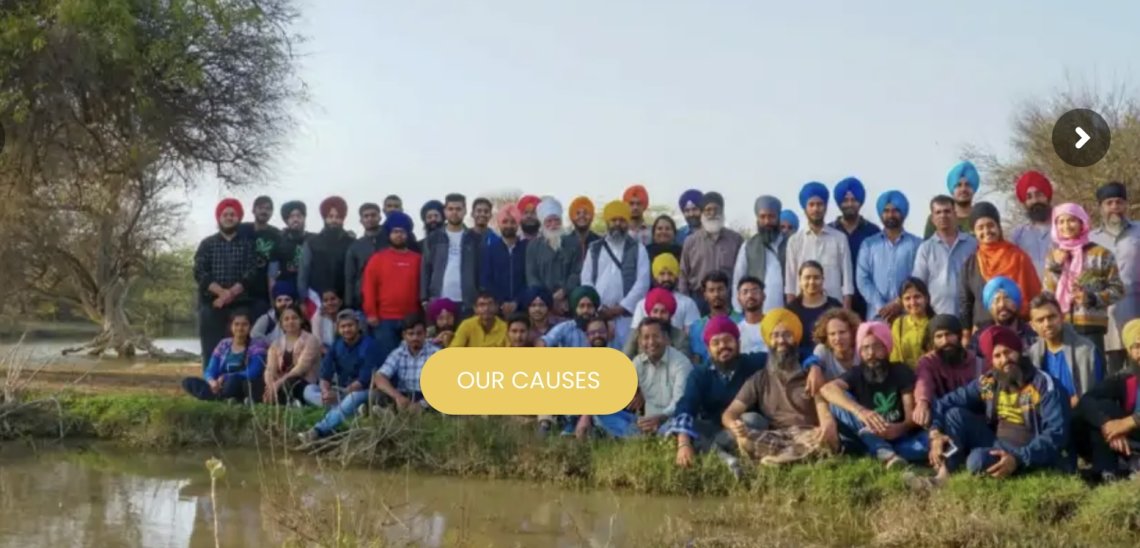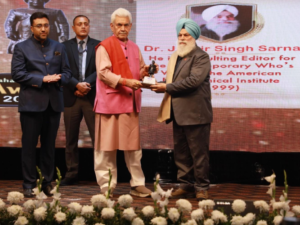The Guru Nanak Sacred Forests represent an environmental initiative of profound significance, intertwining ecological preservation with spiritual teachings rooted in Sikh philosophy. Launched by EcoSikh, a global environmental organization inspired by the teachings of Guru Nanak, the project has catalyzed a movement of ecological restoration and community involvement, bringing people from various sectors together in a shared commitment to restoring natural habitats and fostering sustainable ecosystems.
Global Sikh Environmental Initiative
EcoSikh, founded by Dr. Rajwant Singh, who serves as its Global President, stands as an influential global initiative addressing environmental challenges through the lens of Sikh ethics and spirituality. Established in response to the urgent need for sustainable practices, EcoSikh connects the Sikh community with broader ecological movements to foster environmental consciousness and responsible stewardship. The organization's mission aligns with the principles of Sikhism, advocating for harmony with nature and the responsible management of Earth’s resources.
Dr. Singh, alongside key figures such as Gurpreet Singh, Rasna Kaur, Inderpreet Singh, Manpreet Singh, Bhavdeep Bajaj, Shubhendu Sharma, Charan Singh, and Gurneet Singh, has contributed significantly to the development and propagation of EcoSikh’s initiatives. These leaders actively engage in projects promoting biodiversity, sustainable agriculture, and climate action within communities globally. One of EcoSikh’s landmark initiatives, the Sikh Environment Day, emphasizes the environmental teachings within the Guru Granth Sahib, inspiring millions of Sikhs worldwide to adopt eco-friendly practices.
Through these collaborative efforts, EcoSikh aims to bridge traditional Sikh values with contemporary environmental action, creating a unique platform that emphasizes both cultural heritage and ecological responsibility.
Genesis of the Initiative
The first Guru Nanak Sacred Forest was conceptualized near Bathinda, Punjab, and formally announced at an EcoSikh press conference held in Chandigarh on March 14, 2019. In alignment with the teachings of Guru Nanak Dev Ji, the founder of Sikhism, this project seeks to rekindle the connection between spirituality and environmental stewardship. In just two years, 303 micro-forests comprising approximately 167,000 native seedlings across 80 species were planted, achieving an impressive 95% survival rate. This accomplishment illustrates not only the adaptability of native species but also the collective impact of community-driven efforts.
A Network of Sacred Forests
The Guru Nanak Sacred Forest project extends across various states and regions, forming a network of micro-forests that exemplify biodiversity and ecological resilience. The Kandla Special Economic Zone (KASEZ) in Gujarat has hosted 80,300 plants under the initiative, creating a significant green space within an industrial zone. Similarly, the State Government of Maharashtra has established a 5,500-tree sacred forest within its biodiversity park in Ten District, further demonstrating the initiative’s flexibility and adaptability to diverse ecological and cultural contexts.
In Punjab, EcoSikh collaborated with the government to create forests, including one at the Indian Institute of Technology (IIT) in Roopnagar, inaugurated by the then Chief Minister of Punjab, Captain Amarinder Singh, on June 5, 2019. This forest, like many others, exemplifies the potential of public-private partnerships in ecological conservation and showcases the governmental support the initiative has garnered.
Community and Institutional Engagement
One of the defining aspects of the Guru Nanak Sacred Forest project is its extensive community engagement. The project has successfully mobilized participants across a wide spectrum of society, including government departments, industries, village panchayats, NGOs, and educational institutions. Over 100 forest guards and officers from the Punjab Department of Wildlife and Forests have been trained by EcoSikh in forest-making techniques, underscoring the project’s commitment to sustainable forestry practices and capacity-building.
The EcoSikh initiative has seen widespread involvement from the industrial sector as well, with companies like Weltech Group, Bajaj Sons, Swaraj Tractors, and Sajjan Precision hosting sacred forests on their lands. Sajjan Precision Castings has even established a nursery dedicated to EcoSikh, housing 25,000 plants across 40 native species, reflecting a long-term investment in ecological regeneration.
In addition to industry, numerous village panchayats in Punjab have created forests on local cremation grounds and school grounds, further embedding the initiative within the cultural and social fabric of rural communities. Educational institutions, including the Datar Educational Trust, Guru Gobind Singh College, and Baba Banda Singh Bahadur Engineering College, have hosted workshops to train students and staff in forest-making, instilling environmental awareness and skills in younger generations.
Sacred Forests and Sikh Philosophy
The Guru Nanak Sacred Forest project is deeply rooted in the Sikh philosophical perspective on nature, which emphasizes a harmonious relationship with the environment. Sikh scriptures, particularly the compositions of Guru Nanak Dev Ji and Guru Har Rai Ji, espouse reverence for nature as an expression of divine will. EcoSikh’s publication, Verka Ek Bageecha, compiles shabads (hymns) from the Guru Granth Sahib that discuss humanity’s relationship with the environment, advocating for a compassionate approach to ecological stewardship.
This ethos is further symbolized by the dedication of sacred forests to the teachings of Guru Nanak and other Sikh Gurus, particularly Guru Har Rai Sahib , known for his environmental sensitivity and protection of medicinal plants. EcoSikh’s efforts serve as a tribute to these Gurus, encouraging Sikh communities worldwide to embody these values through tangible actions that benefit the planet.
Key Achievements and Milestones
The impact of the Guru Nanak Sacred Forest initiative extends across various domains, with numerous achievements underscoring its effectiveness:
1. Institutional and Government Partnerships: In addition to collaborations with state governments and institutions, EcoSikh has engaged with the Department of Agriculture in Punjab and the Municipal Corporation of Mohali, facilitating forest creation on government lands. These partnerships underscore the initiative’s scalability and its potential for integration into public environmental policies.
2. Corporate Contributions: Numerous companies have supported the initiative, hosting forests on their properties, establishing nurseries, and providing logistical support. Big Ben Group, for instance, initiated a Guru Nanak Sacred Forest of 550 trees in memory of Sardar Angad Singh Ji, blending ecological action with personal tribute.
3. Educational and Community Outreach: Over 850 forests have been planted across Punjab and other parts of India, involving schools, colleges, and local communities. For example, students from Government Middle School participated in the plantation process at Big Ben, fostering environmental consciousness among youth.
4. Religious and Environmental Leadership: The involvement of Padma Shri awardee Baba Sewa Singh Ji of Khadur Sahib adds a spiritual dimension to the initiative, as he participates in forest creation and shares his knowledge of environmental conservation with communities, reinforcing the initiative’s spiritual and cultural roots.
5. Significant Green Spaces: Guru Nanak Sacred Forest with 11,000 seedlings and 53 native species has been planted at Angels Valley School in Rajpura, creating an educational resource for students while contributing to local biodiversity. Similarly, a 10,000-tree forest at Government Science College in Jagraon, Ludhiana, exemplifies the large-scale impact of the project.
Conclusion
The Guru Nanak Sacred Forests initiative epitomizes the convergence of spirituality, community action, and ecological restoration. By integrating Sikh principles with environmental activism, EcoSikh has not only contributed to reforestation but also cultivated a holistic approach to conservation that resonates with diverse communities. The initiative encourages people of all backgrounds to reconnect with nature, fostering a sense of shared responsibility towards the environment. As it continues to grow, the Guru Nanak Sacred Forests initiative stands as a testament to the power of collective action in nurturing and preserving the natural world, inspired by the timeless teachings of Guru Nanak Dev Ji.








